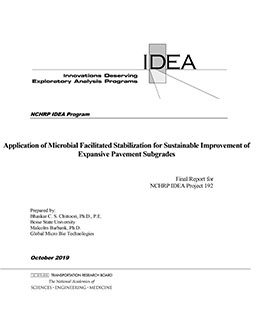Application of Microbial Facilitated Stabilization for Sustainable Improvement of Expansive Pavement Subgrades

Expansive soils, also known as swell-shrink soils, have been a problem for civil infrastructure such as roads and foundations since ancient times. These soils swell and shrink with changes in moisture content, causing buildings and pavements to crack. The reason for this behavior is the presence of the heaving/swelling mineral that expands when exposed to water. These soils are present in the majority of the states in the United States and cover about one-fifth of the land area of the country. Expansive soils cause millions of dollars of damage each year to transportation infrastructure across the country.
The TRB Highway Innovations Deserving Exploratory Analysis Program’s IDEA Final Report 192: Application of Microbial Facilitated Stabilization for Sustainable Improvement of Expansive Pavement Subgrades is an evaluation of the application of environment-friendly biological processes to stabilize expansive subgrades. Current stabilization options have been inadequate, especially to pavement infrastructure, and result in expensive rehabilitation activities.
Microbial-induced calcite precipitation (MICP) is an innovative approach that uses soil bacteria to precipitate calcite and alter the behavior of the soil. Experience with MICP implementation has been primarily using bioaugmentation (introducing microorganisms into the soil), especially in the case of sands where microbial populations are minimal. This method has several issues, including the survivability of the bacteria in the new environment, which results in uncertain treatment performance. However, in the case of clays, there is no need to introduce exogenous bacteria, as clays are natural incubators for microorganisms. Hence, this research study used bio-stimulation to encourage indigenous bacteria to precipitate calcite and alter soil behavior.


